An entire book could be written on this topic (perhaps I’ll do that someday) but to keep this as brief as possible, the short reason this is a problem is the Bible has nothing good to say about the practice of magic (neither does extra-Biblical Christian tradition). No translation of Scripture will record the 12 Disciples watching Jesus walk on the water and say, “Wow, that was magical!” Nor is the mana falling from heaven in Israel’s wilderness wanderings described as some kind of powerful spell that Moses used, nor even is his rod described as “magic,” even though Moses had the power granted to him by God to turn it into a serpent at whatever time he chose. No, the Bible describes events like these as “miracles,” or “signs,” or “wonders.”

Supernatural power from God at the parting of the Red Sea. Image credit: Allcreatures.org
A verse in Isaiah (8:19) directly contrasts reliance on God with the use of magic: “When they say to you, ‘Consult the mediums and spiritists who whisper and mutter,’ should not a people consult their God? Should they consult the dead on the behalf of the living?” (That’s the NASB–the King James Version uses the word “wizards” instead of “spiritists.”) Note this verse is specifically talking about necromancy for the purpose of divination in context, but note that the Bible has many examples of non-divination magic, magic also not shown to be directly connected to raising up spirits. This passage points out the fundamental reason why seeking “magic” (as the Bible defines it) is wrong and the reason is not limited to necromancy–it’s wrong because it detracts from seeking God and his power.
Note that the passage in Deuteronomy 18 that E. Stephen Burnett made the focus of his comments (verses 10-11) says: “10 There shall not be found among you anyone who makes his son or his daughter pass through the fire, or one who practices witchcraft, or a soothsayer, or one who interprets omens, or a sorcerer, 11 or one who conjures spells, or a medium, or a spiritist, or one who calls up the dead.” The very first thing this passage references is a Canaanite practice of offering an infant to their gods in an attempt to manipulate their favor–that is, the very first act condemned along with a list of magical practices is actually something the Canaanites would have defined as an act of worship to their gods. This why “seeking supernatural power from sources other than God” is the glue that binds this passage together and which applies to all the specific practices it lists. Yes, at the time of writing of that passage, divination was probably the most common practice of those who sought to work “magic”–but it was by no means the only one. It was not even the first or most important one in this particular passage and as I’ve already shared, magic refers to many other things that have no connection to divination in the Bible, including manipulation of forces of nature by Pharaoh’s men, which looks pretty much like magic in many fantasy stories.
“So why bother putting magic in stories at all?” someone might ask. “If magic can be an issue, why shouldn’t a Christian writer leave it out of stories altogether?” I’d say there are three basic reasons to work out a means to include magic in stories: 1) Fantasy is a popular genre with loads of readers. It makes sense to desire to reach them within their genre expectations from a strictly analytical point of view. Not to mention it can inherently interesting to write fantasy for people who’ve read it–and fantasy normally contains magic. 2) Fantasy has the ability to use analogy or allegory or myth-making to create powerful messages about the world we live in. And what the story calls “magic” can be a key part of any such analogy. C.S. Lewis achieved using the word “magic” that way in the Chronicles of Narnia, in fact. 3) And it so happens to be that magic is a staple of fantasy as much as aliens are a staple of science fiction. You could write the one without including the other, but it would not really represent the genre well for the most part. Or be as interesting.
So, how to proceed? I would say the basic task is to make it plain the magic in the story world is not the same thing as the sorcery the Bible condemns. In order to harmonize with the Bible’s condemnation, a Christian writer must make it plain that the supernatural power referenced in the story is not in fact in opposition to reliance on the Creator God of the Bible. I know of six good ways to do this (and will reference a seventh way):
1. Only the villains have “magic.”
This is probably the most straightforward approach. Bad guys use spells, sorcery, incantations, and magic items. Good guys are stuck with either plain items devoid of any magical powers, or have supernatural power openly linked to God and under His control rather than theirs (and which is never described by the term “magic”). The Left Behind series actually shows baddies into witchcraft whereas the good guys, especially the two prophets in Jerusalem, call down supernatural power overtly in the name of God. To take this notion into the realm of fantasy, take this same sort of thing but instead of setting it on Planet Earth, put it in a world of imagination, but one where God is still God, though perhaps under a different name (e.g. Aslan–though note that magic in Narnia is not just reserved for the villains).
2. Rename miracles and prophets as “magic” and “wizards.”
Take a person who acts like a prophet of the Old Testament, but call him or her something other than “prophet.” Create situations similar to Moses parting the Red Sea or Elijah lighting the sacrifice to God with fire from heaven, but don’t call it prophecy or a miracle or a sign or a wonder. Call it “magic” or “sorcery” instead and those who them “wizards” who call upon the equivalent of the name of God in the story. By linking the activity you’re calling “magic” clearly to the Creator God in the story, you’re making it plain that you’ve simply changed the functional definition of “magic” within the context of your story world. Doing this would take advantage of the fact that fantasy readers expect magic in a tale, but turns their expectation on its head so the story magic works the opposite from how the Bible negatively uses the word. Therefore, done correctly, such wizards would really point back to prophets and their sorcery powers back to God’s power (by whatever name He is presented in the story). Readers who are not Bible-savvy may not immediately notice that the story points back to a Biblical way of seeing the supernatural, even though that’s what it would do. By the way, L. B. Graham, Christian author of fantasy, has used this approach in some of his books.
3. Treat “magic” as an allegory for the workings of God.
I’m thinking especially of how C.S. Lewis used the term “Deep Magic” as a description of what the “Emperor-beyond-the-sea” had written in the stone table where Aslan was sacrificed (in The Lion, the Witch, and the Wardrobe). It stated that the White Witch was entitled to kill every traitor and if anyone denied her that right, then all of Narnia would perish in fire and water. But an even deeper magic said that if a willing innocent victim was killed in the place of a traitor, then the Stone Table would crack and death would be overcome. Clearly this references how Christians see Christ dying on the cross for sin, but is phrased as “magic.” A story could call other acts of God or properties of God that parallel what we know to be true, “magic.” Wizardry of this sort would not in fact allow characters to use spells (because “magic” is part of the structure of the universe) and as such might call for the addition of another method of dealing with “sorcery” (one that does allow spells). Though I can imagine a fantasy story without spells at all in which all references to “magic” are simply to acts of God in allegorical form.
4. Treat magic as a form of undiscovered science.
I have imagined in stories I’ve written that magic is a kind of physics that operates in other universes but which is undetectable here. I conceived of magic as a form of power that flows though the multiverse not unlike how electricity flows through a circuit. For universes closest to the source, this power is readily available. The power is subject to manipulation by acts of the will and spoken words (so the use of this power resembles spells), but other universes drain most of the power by the time it hits our universe, so it has never been discovered in our world. In universes that have active magic, wizards are like scientists who study the properties of the invisible and learn how to use it, like how scientists learn to manipulate the forms of energy and matter we know about. Like science, such power can be used for either good or evil and like technology, there are unexpected residual wastes that can be harmful.
Other novelists have invented other means in which “magic” is either science by another name (as I’ve done myself in the “Time of Magic” referenced in Medieval Mars) or have stated magic is an undiscovered science. Note that making sorcery equal science may create a story universe very similar to ones written from a non-Christian perspective, of the sort that have wizards and spells. But the difference is the kind of story that creates magical power which can be used in a neutral sense isn’t really supernatural power anymore. It’s the power derived from the ordinary physical world as much as photography, internal combustion engines, and atomic power is. What is called “magic” really should be considered part of the natural order in such stories.
It still would be possible for a character to seek supernatural power in an illicit way in such a story world by knowingly circumventing whatever understanding of God he or she had, which would amount to the sin of witchcraft, i.e. trying gain supernatural power without God. Which in that story universe would be a separate thing from the use of magic as in science by another name or in another form.
5. Blend the lines between the supernatural and natural into a strange universe.
What I just suggested in effect blends the supernatural and natural by making acts that would appear to be supernatural merely natural acts, merely the acts of a type of science instead. But I’m suggesting here goes the opposite way.
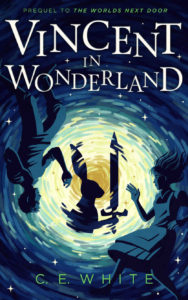
A recent example of a Christian writer using “strange universe magic.” Image copyright: C.E. White
Instead of giving everything a natural explanation, nothing has one. Everything is off-the-rails strange and nothing can be said to be a deliberate attempt to achieve the supernatural without God because everything (or most everything) is already supernatural from the point of view of planet Earth as we know it. I’m thinking of Alice in Wonderland or The Wizard of Oz type story universes, where scarecrows and rabbits talk, where changing your size is a matter of what you eat and drink, and tornadoes will transport a house to another land without killing its occupants.In this kind of strange universe, magic is so worked into the fabric of everything that it isn’t special and using it is as natural as walking and breathing. Then that sort of magic does not relate to the Biblical condemnation of people seeking the supernatural without God. Though such a story can shut out God by never mentioning Him and can act as a sort of allegory for witchcraft, it certainly does not have to be. A story universe like this can just as soon mention God in various ways, even though the classic examples I mentioned do not.
6. Treat magic as an innate special ability in analogy to spiritual gifts.
This approach in some ways is a subset of #5, but can also employ notions of #4 as well. It might seem logically contradictory for a story to be both more and less scientific in its approach to the supernatural at the same time, but the author I know who uses this method makes both work. Kat Heckenbach starting in Finding Angel treats the power of magic as a gift that an individual has, given from beyond herself or himself. As such, her approach runs parallel to what the Bible has to say about spiritual gifts, almost forming an allegory of them. Yet since working the supernatural is just a natural ability, she in effect makes the supernatural more common and ordinary as per point #5. But at times she gives specific descriptions of how someone’s ability affects matter or energy in terms someone who has studied science on planet Earth would recognize. Which goes back to #4. In truth, Kat’s approach is unique, but her basic idea of making magic an inherent gift the magic user possesses can well harmonize with a worldview that does not include witchcraft in the Biblical sense of the term.
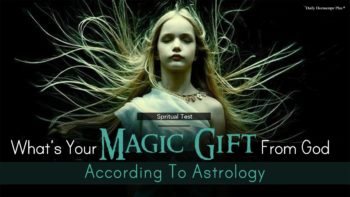
Dragging magic God condemns into an examination of God’s gifts. Image credit: ohippo.com
Note though that Pagans too have imagined that someone could be born with an innate ability to perform magic that does not really require casting of spells in the ordinary sense. Obviously, if they link such an inherent ability to their gods and goddesses, this would be a portrayal of magic the Bible would condemn. (It’s even possible to corrupt this idea in other ways, as to imagine Christians should be using astrology, tarot, ouija, or other forms of divination the Bible would condemn to find out their “spiritual gift from God”.)
7. Downplay the Biblical objection in the first place.
This approach seventh would be to either ignore altogether what the Bible says about magic or claim it only references a specific kind of attempt to gain supernatural power without God. I have heard people use the verse I quoted in Isaiah to claim the Bible does not condemn all magic, it only condemned necromancy, that is, trying to interact with or raise the dead. Or as I mentioned, some claim that Deuteronomy 18 only references divination or the point of Isaiah 8 amounts to divination as well. So as long as you stay away from these specific kinds of magic, the thinking goes, you’re clear. Which is why I gave examples outside of Isaiah and Deuteronomy. In fact, the Bible condemns far more that just necromancy and divination. It takes a broad shot at seeking supernatural power apart from God as a whole, though we need to understand by study what that really means.
I don’t recommend approach #7. I think one of the things that distinguishes an overtly Christian writer of speculative fiction is the attempt to work these issues out by some means or other. Not to ignore them. It does not mean conformity to just one way of thinking and it doesn’t mean it’s impossible to be creative or imaginative. (Kat certainly was creative in her solution.)































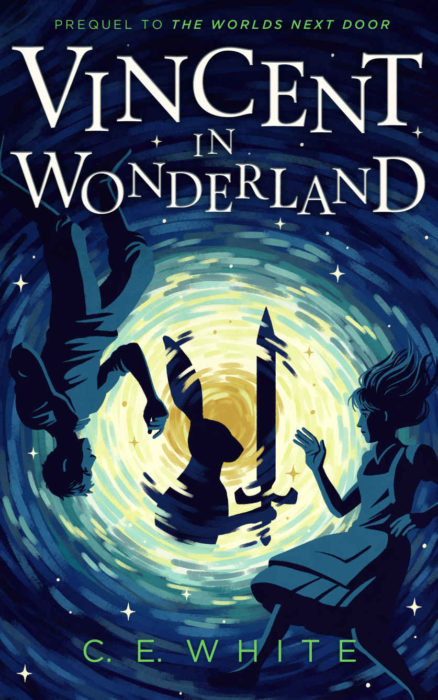

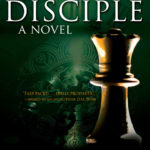
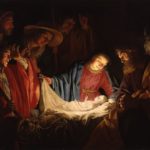
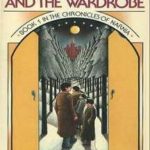
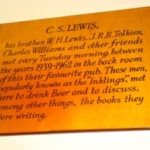



I have a book being published this year. Classified as religious fiction we journey through a land that time’s forgotten with a twelve year old girl. Several adults who claim to be Christian go through struggles, wrestle with faith, along the way she demonstrates wisdom beyond her years and angels appear. Christ rescued me from the darkness l once practiced so it’s my literary endeavor to write the Christian counter to the Potters.
I’m not convinced that this is a problem worth so much worrying. Or even that it’s actually a real problem. Kids understand the difference between real-life expectations and just-a-story, except for maybe very young kids, and they grow out of it.
Except this isn’t about the kids, is it. This is about weird holier-than-thou games that church people play. But you have to play it, too, if you want to sell them books.
I believe there are several real problems dealing with magic but I intend to talk about that next week in more detail.
Selling books matters, too. But my primary concerns don’t revolve around selling books.
Usually it isn’t a problem, though now and then it is, and those uncommon times it’s a problem are probably what people react to.
I don’t really write the way I do to play church games. I’m not afraid of Christians at all and write what I want to write. Honestly, if there’s any ‘games’ that I worry about, it’s more along the lines of worrying about Woke Tumblr and the like, since there’s a lot of people like that that misconstrue what people say and then attack them based on false premises.
But my focus is more on communicating effectively and clearly so that people hate me less, rather than completely trying to fit a mold just to be acceptable.
Woke Tumblr probably seems scarier because you’re less familiar with the many many MANY varieties of liberals. You got your Bernie bros and your marxist-flavored workers’ rights peeps, anarchists, Antifa, the many assorted flavors of identarians from your feminists and the racial equity people and the disability advocates to the porpskillion subtypes of gays and gender noncomformists.
But besides falling under the liberal umbrella, but thing they most have in common is that they fight amongst themselves as often or more so than with outsiders. Like the various Christian denominations.
Eh, yeah. There’s different groups that will behave differently, and even further it’s probably something that has to be defined by what individuals do. I kind of said Woke Tumblr because I wasn’t sure how to define the type of people I’m talking about, except to say ‘radicals’ or ‘unreasonable toxic jerks’ maybe.
I fear God. Not my brothers and sisters.
Well, I had a friend growing up that wasn’t even allowed to read/watch Narnia because it talked about magic. My parents sort of forbade magic too, but not nearly to that extent. I was still allowed to watch mythology stuff like Hercules, but not things revolving around sorcery like Harry Potter.
I sort of bypass the problem in my fantasy stories by not really having magic in there at all. Most weird things have some sort of natural or spiritual explanation, though I don’t consider spirituality and magic the same thing, at least within a story. To an extent I also favor approaches 4 and 5.
I guess to an extent my approach can make the story blur the line between scifi and fantasy, but I don’t think fantasy has to have magic or even spirituality in it to qualify.
But I sort of sympathize with people that love fantasy but either aren’t allowed to read magical stuff or aren’t interested in magic, so that’s one reason I write the way I do, though not the main one.
Now days, though, there also really does seem to be a trend to treat magic almost like science or a natural ability. To an extent it does make Christians look bad, because people hear Christians protesting so hard against magic, and then their minds go to how it’s depicted in stories: as another form of science or a natural ability. So they see it as yet another situation where they think Christians would hinder scientific progress or harass people over harmless things they can’t change, if magic was indeed real. So to them, it proves some stereotypical mentalities they think all Christians have.
I heard the series Merlin takes the approach of showing magic as an ability people are born with–though the series also praises Druids and shows them as enlightened and good, when we know for a certainty they practiced the kind of magic God condemned in the Bible.
What’s a bit funny to me is how many people seem to be looking for an “easy” button for spiritual matters. That’s what’s appealing about legalism–a rule to cover everything, so you don’t have to think things through individually.
But the opposite does the same thing! Going Libertine or against all rules ALSO is a way to make life simpler. Simpler than legalism–no rules at all!
When in fact I’d say the spiritual life requires some work and some effort and some thought and Bible study and prayer. Not all situations are alike and so they require different solutions, each one, that can’t be captured in a set of simple rules–though some rules still might apply.
But in regard to your comment about magic being like science, I’m saying that’s a legitimate way to portray magic. So my post isn’t anti-science…you didn’t specifically say that it was, but I thought it best to be extra-clear. 🙂
Yeah, it does require work, as well as self awareness and stuff. The ironic thing about people that dance around and say ‘yay, no rules!’ is that they actually DO believe in rules and structure in some form or another, even if it’s just in the form of getting mad at people that transgress any instinctive boundaries they may have.
As for Merlin…I’ve only seen some of the earlier episodes, but I found it weird that the show was essentially trying to depict everyone that opposed magic as bigoted and evil, while also having the vast majority of the magic users be bad or harmful in some way. Yeah, maybe the King went too far and needs to rethink his mindset, but he obviously was responding to a real problem. The exact way the show handled the issue (in the episodes I saw) seemed to undermine the point it tried to make.
And yeah, don’t worry, I didn’t think you were being anti science at all. 🙂 I was just saying that I do prefer a more scientific approach to fantasy, and that I often won’t even have magic there as an ‘energy source’. But I know some people act like fantasy HAS to have magic, so I was trying to address anyone that might think that. And in the last paragraph I was just commenting on the societal trend of stories depicting magic as a natural ability or science, and the effect that has on the way Non Christians might view us.
I’ve only seen enough Merlin to know that it annoys me on an irrational, b*tch-eating-crackers level. Like, is Arthur ever not wearing chain mail? Does Merlin ever not wear his neckerchief?
I think I actually know what meme you’re referring to right there 😛 I didn’t really care for that show either, though not for the same reasons. I guess I care more about characterization and how much the narrative makes sense. I don’t detest the show, but I wouldn’t watch it unless I was hanging out with someone that wanted to see it.
Good points!
Thank you for covering such a sticky topic!
You’re welcome!
In my No Ordinary Fairy Tale series, where most of the main characters are faeries, magic is an inborn energy given to faeries by the Great Gardener to protect themselves and serve humanity. It becomes Dark Magic when it’s used for selfish gain or to manipulate another person against their will (ie. mind control), and that’s unequivocally described as evil. A “spell” or “charm” is simply a description for anything that a faery does by concentrating and exerting their magical strength — there are no words, gestures or objects involved.
My most recent fantasy series, however, takes place in an alternate-universe version of 1930’s Toronto which runs on spell power. The magic in this world is definitely more like science — it’s brought forth by combining items that are naturally imbued with magical power, whether you do it in the form of cooking/baking magical herbs and other ingredients into tablets (Common Magic) or by shaping magical gems and metals into charms (Sagery). It’s a matter of using resources already part of the created universe, rather than seeking to steal power that wasn’t rightfully given to humanity.
All that being said, it’s interesting to note that my mother (who doesn’t read much fantasy, or indeed much fiction at all) had no theological beef with the faery books when she read them, but when I gave her A POCKET FULL OF MURDER she was a bit troubled by the idea of my human heroine baking “spell-tablets” in her kitchen. We ended up chatting about the difference between fantasy magic and the occult, and she seemed satisfied that I wasn’t endorsing something the Bible rightfully condemns. But it did make her uneasy at first to read about a “good” human character making “magic”, and it reminded me that a lot of people from conservative church backgrounds feel uncomfortable reading fantasy, even avowedly Christian fantasy, for that reason.
Yeah I agree that some people are simply uncomfortable with fantasy. My post isn’t really about them–it’s about how to write fantasy that takes the Biblical prohibitions against magic seriously–but is fantasy nonetheless.
Well, my mother isn’t uncomfortable with fantasy on principle, she just isn’t familiar with anything beyond Lewis and Tolkien (which my father read aloud to the family when I was young). So I found it fascinating that she was A-OK with the idea of magic as a good thing when practiced by non-human characters, but troubled by the portrayal of magic as a good thing when practiced by human ones. I would have thought that she’d either be troubled by both or neither.
This is something I’ve thought about a lot. I grew up with Narnia being the most magic my parents approved of and I was fine with that. But since I starting reading more fantasy, and begun writing, I’ve developed more complex views.
The one thing I want with fantasy magic is to know where is comes from. Is this sorcery, witchcraft, demonic power? If it is, is it portrayed as evil?
I still don’t write with magic much. One story I worked on last year didn’t have clear enough explanations for my liking, and blended inborn ability and evil power. It just didn’t sit right with my conscience.
The other novel with magic that I’ve begun writing uses a mixture of methods 1,2, and 4. It also features a protagonist who believes magic is evil. I challenged to write a portal fantasy novel and it turned into an exploration of the question of magic.
I think linking demonic power to magic is an important story distinction to make. Perhaps some magic would be clearly linked to demons (in a story) but others might tap into what symbolizes the power of God.
Travis, thank you so much for your words on this topic. Magic is a subject I and many of my writer friends have discussed at length. I think your comment “…what really matters in this discussion is how God is portrayed in stories and what is the relationship between the user of magic and God” is so true. I think as Christians we can tend to recognize God as the source of miracles, etc., but we often act like there isn’t a real source or real power behind things like spells and divination here in the real world. However, since this kind of power isn’t just a concept in fantasy but does actually exist here, it is very important for us to be handling supernatural power accurately and identifying its source correctly (either of God or of Satan) both in our life and in our writing. Thank you again for addressing this topic.
Given, I think what has happened is the skepticism of the Enlightenment about the supernatural affects Western Christians (Christians in the developing world have different attitudes). We Western Christians really do tend to think Witchcraft is simply fictional and as a result tend to blow off any effects of the supernatural in the real world–but it isn’t fictional. (Or we overreact the other way and ascribe too much power to Satan…)
Thank you for pointing out power can come from God or Satan in the real world because I forgot to mention that in the real world there are some people who actually claim to be doing magical spells by the power of God. But in reality, God gives His people prayer to seek him. Yes, the Old Testament had something else, the Urim and Thummim by which to seek the will of God, but that doesn’t exist any longer. So people trying to use a form of divination to seek God’s will are in fact doing something they shouldn’t do. Prayer is the means we are taught to seek God in the real world.
Thank you again for your comment.
Great article, and written at the appropriate time for me. I’m editing my 190k epic fantasy novel and my developmental editor pointed out that my magic system needs to be better defined. The novel shows how the bad guys have all the (evil) magic, and the good guys only have passive resistance if they have committed themselves to God. But I’m thinking of changing that so my protagonist has some form of active “magic” bestowed by his father, and I’m struggling with how to do that from a Christian worldview. So I’m going to print out your article and keep it!
Cool! Glad I could help.
There is also surrealism or magical realism–think Kafka, Borges, and others–in which weird stuff happens for no clear reason and characters deal with it. No one tries to harness it. It just happens.
It might work in the hands of a Christian writer.
Thanks for pointing this out. Though I think events of magic happening for no reason rather reinforces notions of a Godless and irrational universe…though doesn’t have to, of course.
No apparent reason. This happens even in the natural order of life. Why did my neighbor’s five year old drown in a freak accident? Why does my godly preacher have bone cancer?
It reinforces the idea that science does not hold the answers to everything. Scientists are only human and the best acknowledge how little is still known about our physical universe and its laws.
Weird stuff can be used to symbolize truths in an indirect way. For example young salesmen don’t wake up transformed into big bugs but they can have nervous breakdowns or develop tuberculosis. Like the technique used in poetry called a “metaphor conceit.”
Good thoughts on something that bogs a lot of folks down! And thanks for the mention as well, though I’m afraid my treatment of magic was much less intentional than you made it sound! ?
How magic works in a story doesn’t necessarily need to be intentional to come off well!